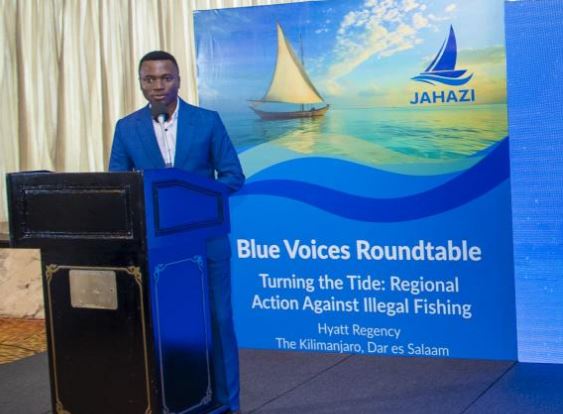
 Michael Mallya, spokesperson for The Jahazi Project, speaking during the Blue Voices Roundtable meeting in Dar es Salaam where East African countries signed a joint pact to curb illegal fishing/HANDOUT
Michael Mallya, spokesperson for The Jahazi Project, speaking during the Blue Voices Roundtable meeting in Dar es Salaam where East African countries signed a joint pact to curb illegal fishing/HANDOUTKenya is tightening enforcement at sea and onshore as East African countries sign a joint pact to crackdown on illegal fishing, a trade valued at more than Sh60 billion annually.
East African governments, conservation groups and coastal representatives have agreed on a regional plan to step up the fight against illegal, unreported and unregulated (IUU) fishing.
The move, announced through a communiqué at the Blue Voices Roundtable meeting convened by The Jahazi Project in Dar es Salaam, seeks to shift from scattered pilot projects to a coordinated regional campaign.
Michael Mallya, spokesperson for The Jahazi Project, said the East African coastline is under assault from practices that deplete fish stocks, destroy habitats and undermine food security.
“A regional coalition can turn the tide,” he said, noting that fisheries sustain more than three million people across the region, including thousands in Kenya’s coastal counties.
The pact comes as Kenya concludes the five-year Kenya Marine Fisheries and Socio-Economic Development (KEMFSED) programme, supported by nearly Sh15 billion from the World Bank.
The project funded data systems, landing-site upgrades and alternative livelihoods in Mombasa, Kwale, Kilifi, Tana River and Lamu counties, with the aim of improving fisheries management, curbing illegal activity and boosting coastal incomes.
On enforcement, the Kenya Coast Guard Service has increased deep-sea patrols, including multi-day deployments by its flagship vessel Doria, in coordination with the Kenya Fisheries Service.
These measures are guided by the Fisheries Management and Development Act of 2016 and new Marine Fisheries Regulations published in 2024, which strengthen licensing, trans-shipment and high-seas authorisations while embedding vessel monitoring into permits.
Regionally, both Kenya and Tanzania are now parties to the UN Food and Agriculture Organization’s Port State Measures Agreement (PSMA), designed to prevent illegally caught fish from entering ports and supply chains.
Tanzanian officials told the meeting that dynamite fishing, once a daily occurrence along the mainland coast, has sharply reduced after years of crackdowns. Still, deep-sea violations persist, reinforcing the case for pooled surveillance across jurisdictions.
The communiqué called for regional information-sharing, harmonised enforcement, community-led monitoring, youth and technology-driven innovations, public awareness campaigns, and policy dialogue to keep agencies accountable.
“The pact will be judged on whether it delivers real benefits for legal fishers and ensures illegal catch is kept out of the region’s ports and markets,” Mallya said.















![[PHOTOS] Gor fans march to Bondo to honour Raila](/_next/image?url=https%3A%2F%2Fcdn.radioafrica.digital%2Fimage%2F2025%2F11%2F753aaa26-999c-40fe-bf2e-409fc6282745.jpeg&w=3840&q=100)

